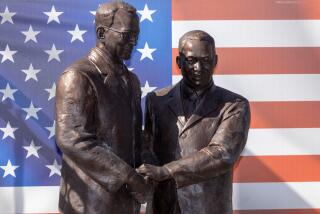Leader of ‘50s Bus Boycott Addresses Soka Audience
- Share via
Civil rights pioneer Rosa Parks said Saturday that recalling battles against racism a generation ago “brings back memories I would rather forget.”
“But since I can’t forget them, I deal with them the best that I can,” the 79-year-old leader of the Alabama bus boycotts of the ‘50s told a cheering audience at Soka University near Calabasas.
Although Parks travels the country talking about civil rights history, she said she does not live in the past. “I keep fighting for justice. I’ll keep struggling for freedom and equality as long as I have the strength. The job isn’t done.”
Parks and other members of a multiracial panel on civil rights said while there is cause for celebration that America is a far more just place for all races than it was 30 years ago, there are still battles being fought because laws that ban discrimination are not always enforced.
Parks became famous in 1955 for refusing to give up her seat to a white man on a bus in Montgomery, Ala. She reminded the audience of the many day-to-day indignities she suffered in the segregated South, where African-Americans were required to use separate bathrooms, lunch counters and drinking fountains. In many restaurants, blacks would not be served inside but instead had to order their food to go.
At the time of her protest, blacks were not only forced to sit in the rear, away from white passengers but they were not even allowed to walk past whites on the way to back rows. Black passengers were required to enter the front door to pay the fare, then exit the bus and re-enter through the rear door. They were only allowed to sit in the last few rows. If there weren’t enough seats for white passengers, blacks were required to stand and give up their seats.
“It was time to let them know that I as an individual wasn’t going to be treated in this manner and we in the community weren’t willing to be treated this way anymore.”
Her arrest on Dec. 1, 1955, led to a bus boycott in Montgomery and galvanized the civil rights movement nationwide.
“For a year, we wouldn’t ride the buses,” said Parks, employed at the time as a tailor’s assistant in a Montgomery Ward department store. “We put up with intimidation and bombings. But we let them know we weren’t going to tolerate that humiliation.”
Parks, who now lives in Detroit, spends much of her time with the Rosa and Raymond Parks Institute for Self Development, a foundation to boost children’s potential by acquainting them with civil rights history and social action.
Other panelists included Glenda Ahhaitty of the Los Angeles Native American Indian Commission; Prof. Alfred Balitzer of Claremont McKenna College; the Rev. Jim Lawson, president of the Los Angeles Chapter of the Southern Christian Leadership Conference; Irene Tovar, a board member of Rebuild L. A. and a longtime Latino activist, and Ron Wakabayashi of the Los Angeles Commission on Human Relations.
Wakabayashi said other groups, such as Asians and Latinos, were inspired by the black civil rights activists. He said Japanese-Americans might not have sought redress for their internment during World War II if they had not seen blacks succeed in changing the system.
“The whole reason we’re here,” Wakabayashi said, “is not because she was treated badly but because she responded to it so courageously.”
More to Read
Sign up for Essential California
The most important California stories and recommendations in your inbox every morning.
You may occasionally receive promotional content from the Los Angeles Times.










